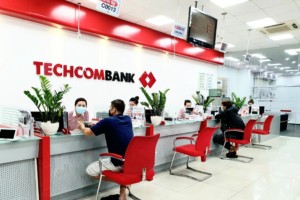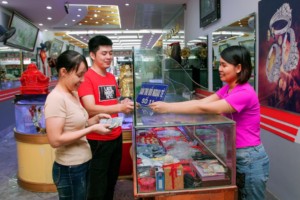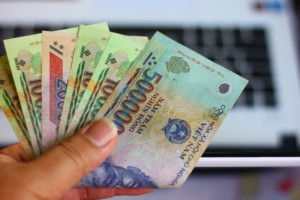Navigating the Vietnamese Dong (VND) and its many denominations can be tricky, but SIXT.VN is here to help you master currency exchange in Vietnam. Understanding the best ways to handle large sums of Dong will ensure a smooth and enjoyable trip. With SIXT.VN, you’ll find that managing your money in Vietnam can be a breeze, allowing you to focus on exploring this beautiful country. Let’s dive into some practical tips for managing VND, and you’ll discover the joys of your Vietnam travel, Southeast Asia tours, and Indochina adventures.
1. Understanding the Vietnamese Dong (VND)
The Vietnamese Dong (VND) is the official currency of Vietnam, and it’s essential to familiarize yourself with it before you arrive. Understanding the various denominations and how to manage them can significantly enhance your travel experience.
The Vietnamese Dong comes in both paper and polymer notes:
- Lower Denominations: Notes under 10,000 VND are made from paper.
- Higher Denominations: Notes from 10,000 VND and above are printed on durable polymer.
Here’s a quick overview of the available denominations:
| Denomination | Material | Common Use |
|---|---|---|
| 1,000 VND | Paper | Small purchases, tips |
| 2,000 VND | Paper | Small purchases, tips |
| 5,000 VND | Paper | Small purchases, tips |
| 10,000 VND | Polymer | Street food, drinks |
| 20,000 VND | Polymer | Souvenirs, local transport |
| 50,000 VND | Polymer | Meals, entrance fees |
| 100,000 VND | Polymer | Shopping, mid-range expenses |
| 200,000 VND | Polymer | Larger purchases, upscale dining |
| 500,000 VND | Polymer | High-end shopping, hotel bills |
The designs on each note showcase Vietnam’s rich culture, featuring landmarks, natural scenery, and President Ho Chi Minh’s portrait. While coins were previously in use, they are no longer circulated, so you’ll primarily deal with banknotes during your trip.
 Vietnamese Dong Denominations
Vietnamese Dong Denominations
It’s also worth noting a local trick: prices are often denoted with a “K” to represent a thousand. For example, 10,000 VND might be written as 10K.
2. Why Managing Large Amounts of VND Is Important
Vietnam is predominantly a cash-based society, particularly in local markets, street food stalls, and smaller establishments. While credit cards are accepted in larger hotels, restaurants, and shopping malls, having cash on hand is crucial for everyday transactions. Exchanging money in Vietnam ensures you’re paying fair prices and avoiding unfavorable exchange rates imposed by individual vendors.
According to a report by the Vietnam National Administration of Tourism, cash transactions still account for approximately 70% of all payments in the tourism sector. This highlights the importance of being prepared to handle cash effectively during your travels.
2.1. Avoiding Transaction Fees
Be mindful of potential foreign transaction fees, typically 3-4%, when using bank cards abroad. Therefore, it’s advisable to reserve credit card payments for major travel expenses, either on-site or online, such as upscale hotels, premium excursions, flight tickets, and significant purchases like jewelry or designer clothing.
SIXT.VN can assist you in planning your major expenses to minimize these fees, ensuring a cost-effective travel experience.
2.2. Wider Acceptance
Although some upscale businesses might accept U.S. dollars or euros, this isn’t universally true. Paying in Vietnamese Dong not only ensures wider acceptance but also helps you avoid unfavorable exchange rates often imposed by individual vendors.
2.3. Fair Pricing
Exchanging money in Vietnam ensures you’re paying fair prices, avoiding potential losses due to poor conversion rates. With SIXT.VN, you can access up-to-date exchange rate information to ensure you’re getting the best deal.
3. Understanding the Challenges of Large Denominations
The Vietnamese Dong can be challenging due to the large number of zeros on the banknotes. It’s easy to confuse denominations, especially the 20,000 VND and 500,000 VND notes, which have similar colors. This confusion can lead to overpaying or being shortchanged if you’re not careful.
3.1. Risk of Confusion
The 500,000 VND note, Vietnam’s highest denomination, is a dark green color that can be easily confused with the 20,000 VND bill. While useful for large payments, it may not be accepted for small purchases due to a lack of change. For daily transactions, carrying smaller denominations is recommended.
3.2. Managing Bulk
Carrying large amounts of cash in any currency can be cumbersome and increase the risk of theft. With Vietnamese Dong, the volume of notes can be particularly challenging.
3.3. Security Concerns
Having a significant amount of cash on hand makes you a potential target for pickpockets or scams, especially in crowded tourist areas.
4. Best Practices for Exchanging Money
Choosing the right place to exchange your currency is crucial for getting the best rates and avoiding scams. Here are some of the best options available in Vietnam.
4.1. Banks
One of the most secure ways to exchange money in Vietnam is through banks. There are many banks in Vietnam that offer currency exchange services, with the top four being BIDV, Agribank, Vietcombank, and Vietinbank. Other banks, such as Eximbank, Techcombank, and Sacombank, also provide exchange services.
- Advantages: High security, clear exchange rates, receipts for transactions.
- Disadvantages: Limited operating hours, potential documentation requirements, longer queues.
4.2. ATMs
Withdrawing local currency directly from ATMs is another convenient option. You can withdraw VND by using your credit or debit card, with the amount automatically converted from your card’s currency to VND.
- Advantages: Availability everywhere, easy access 24/7, no need to carry large amounts of cash.
- Disadvantages: Transaction fees for foreign cards, withdrawal fees from ATMs, limited withdrawal amounts.
According to a survey by the State Bank of Vietnam, the average ATM withdrawal fee for foreign cards ranges from 3% to 4% of the withdrawal amount, plus any additional fees charged by the ATM itself.
4.3. Gold and Jewelry Shops
In Vietnam, gold and jewelry shops often offer money exchange services and provide some of the best exchange rates.
- Advantages: Quick process, favorable rates, lower fees.
- Disadvantages: Risk of unlicensed shops, potential scams, illegal exchange activities.
4.4. Currency Exchange Counters
Currency exchange counters are available at airports, hotels, and shopping malls, providing a convenient option upon arrival.
- Advantages: Accessibility, English-speaking staff, avoidance of less regulated environments.
- Disadvantages: Less favorable exchange rates.
5. Top Tips for Handling Large Amounts of Dong
Managing large amounts of Vietnamese Dong effectively requires a combination of practical strategies and awareness. Here are some essential tips to help you navigate the currency like a pro.
5.1. Carry a Mix of Denominations
To handle daily expenses smoothly, carry a mix of small and large denominations. Smaller notes (1,000 VND to 20,000 VND) are perfect for street food, tips, and local transport, while larger notes (50,000 VND to 500,000 VND) are suitable for meals, shopping, and hotel bills.
5.2. Use a Money Belt or Secure Wallet
Protect your cash by using a money belt or a secure wallet. These accessories are designed to be discreet and difficult for pickpockets to access, keeping your money safe and secure.
5.3. Divide Your Cash
Instead of keeping all your cash in one place, divide it into multiple smaller amounts and store them in different locations. This minimizes the potential loss if one of your stashes is compromised.
5.4. Be Discreet
Avoid displaying large amounts of cash in public. When paying for something, discreetly take out the necessary amount without flashing your entire stash. This reduces the risk of attracting unwanted attention.
5.5. Count Your Money Carefully
After exchanging currency or receiving change, always count your money carefully to ensure you have the correct amount. Double-check the denominations to avoid confusion, especially with the similar-looking notes.
5.6. Use Digital Payment Options When Available
While cash is king in Vietnam, more and more establishments are accepting digital payments, such as credit cards and mobile payment apps. Take advantage of these options when available to reduce the amount of cash you need to carry.
5.7. Plan Your Expenses
Planning your expenses in advance can help you estimate how much cash you’ll need each day. This allows you to exchange smaller amounts more frequently, reducing the risk of carrying too much cash at once.
5.8. Be Aware of Your Surroundings
Stay vigilant and be aware of your surroundings, especially in crowded tourist areas. Keep an eye on your belongings and be cautious of suspicious individuals.
5.9. Store Excess Cash Safely
When you’re not using your cash, store it in a safe place, such as a hotel safe or a locked suitcase. This protects your money from theft and provides peace of mind.
5.10. Inform Your Bank
Before traveling, inform your bank of your travel plans to avoid any issues with your credit or debit cards. This ensures that your cards will work smoothly when you need them.
6. How SIXT.VN Can Help
SIXT.VN is dedicated to making your travel experience in Vietnam as smooth and enjoyable as possible. Here’s how we can assist you in managing your currency and overall travel plans:
6.1. Airport Transfers
SIXT.VN offers reliable and convenient airport transfer services, ensuring you have a stress-free start to your trip. Our drivers can assist you with finding ATMs or currency exchange counters upon arrival, making it easy to get the cash you need.
6.2. Hotel Booking
We provide a wide range of hotel options to suit your budget and preferences. By booking your accommodation through SIXT.VN, you can take advantage of secure payment options and avoid the need to carry large amounts of cash for your stay.
6.3. Tour Packages
Our expertly crafted tour packages cover all your major expenses, including accommodation, transportation, and entrance fees. This allows you to minimize the amount of cash you need to carry and focus on enjoying your travel.
6.4. Real-Time Exchange Rate Information
SIXT.VN provides access to real-time exchange rate information, helping you make informed decisions about when and where to exchange your currency. This ensures you get the best possible rates and avoid being overcharged.
6.5. Local Support and Guidance
Our local team is available to provide support and guidance throughout your trip. Whether you need assistance with finding reputable currency exchange locations or advice on managing your cash, we’re here to help.
Address: 260 Cau Giay, Hanoi, Vietnam.
Hotline/Whatsapp: +84 986 244 358.
Website: SIXT.VN.
 Currency Exchange in Vietnam
Currency Exchange in Vietnam
7. Case Studies: Real-Life Scenarios
To illustrate the practical application of these tips, let’s examine a few real-life scenarios:
7.1. Scenario 1: The Budget Traveler
Challenge: A solo traveler on a tight budget needs to manage their cash effectively to make the most of their trip.
Solution: The traveler uses a money belt to keep their cash safe and exchanges small amounts at reputable banks. They carry a mix of small denominations for street food and local transport, and they take advantage of free activities and attractions to minimize expenses.
7.2. Scenario 2: The Family Vacation
Challenge: A family with young children needs to handle a larger budget while ensuring their money is safe and accessible.
Solution: The parents divide their cash into multiple smaller amounts and store them in different locations. They use a secure wallet for daily expenses and book accommodation and tours through SIXT.VN to minimize the amount of cash they need to carry.
7.3. Scenario 3: The Luxury Traveler
Challenge: A traveler seeking a high-end experience needs to manage their cash for upscale dining and shopping while ensuring their money is secure.
Solution: The traveler uses credit cards for major expenses and carries a smaller amount of cash for tips and small purchases. They store their excess cash in a hotel safe and rely on SIXT.VN for secure transportation and accommodation.
8. Essential Phrases for Currency Exchange
Knowing a few basic Vietnamese phrases can be incredibly helpful when exchanging money. Here are some useful phrases:
| Phrase | Meaning |
|---|---|
| “Tôi muốn đổi tiền.” | “I want to exchange money.” |
| “Tỷ giá hôm nay là bao nhiêu?” | “What is the exchange rate today?” |
| “Tôi có thể dùng thẻ tín dụng không?” | “Can I use a credit card?” |
| “Xin vui lòng cho tôi hóa đơn.” | “Please give me a receipt.” |
| “Tiền này có thật không?” | “Is this money real?” |
| “Cảm ơn.” | “Thank you.” |
9. What to Do If You Encounter Counterfeit Currency
Receiving counterfeit currency can be a stressful experience, but knowing how to handle the situation can minimize the impact. Here are the steps you should take:
- Identify the Counterfeit: Familiarize yourself with the security features of Vietnamese Dong banknotes, such as watermarks, holograms, and security threads. If you suspect a note is counterfeit, compare it to a genuine note and look for inconsistencies.
- Report to the Exchange Counter: If you receive a suspicious-looking note at an exchange counter, bring it to the attention of the staff immediately. They may be able to exchange it for a genuine note or provide further assistance.
- Contact the Police: If you discover counterfeit currency after leaving the exchange location, report it to the local police. Provide as much information as possible about where you received the note and any other relevant details.
- Do Not Attempt to Use It: It is illegal to knowingly use counterfeit currency. Do not attempt to pass it on to someone else, as this can result in legal consequences.
 Avoiding Counterfeit Currency
Avoiding Counterfeit Currency
10. Frequently Asked Questions (FAQs)
10.1. Is It Better to Exchange Money Before Arriving in Vietnam?
It’s generally better to exchange money in Vietnam, as you’ll likely get a more favorable exchange rate. However, it’s a good idea to exchange a small amount before arriving to cover immediate expenses like taxi fares.
10.2. How Can I Avoid High Transaction Fees When Withdrawing from ATMs?
To minimize ATM fees, withdraw larger amounts at once (within the limit) and check if your bank has partnerships with Vietnamese banks for fee-free withdrawals.
10.3. Can I Use US Dollars or Euros Directly in Vietnam?
While some tourist areas may accept USD or EUR, it’s best to exchange money and pay in VND for the most favorable rates.
10.4. Is Tipping Common in Vietnam, and How Much Should I Tip?
Tipping is not mandatory but appreciated for good service. A common practice is to tip around 10% of the bill in restaurants and round up the fare for taxi drivers.
10.5. What Should I Do If I Run Out of Cash?
If you run out of cash, you can withdraw more from ATMs or use credit cards at establishments that accept them. Alternatively, you can visit a bank or a reputable currency exchange location.
10.6. Are There Any Restrictions on Bringing Foreign Currency Into Vietnam?
There are no restrictions on bringing foreign currency into Vietnam, but you may need to declare amounts exceeding $5,000 USD or its equivalent.
10.7. Can I Exchange Money Back to My Home Currency Before Leaving Vietnam?
Yes, you can exchange Vietnamese Dong back to your home currency at banks or currency exchange counters before leaving Vietnam.
10.8. What Are the Opening Hours for Banks in Vietnam?
Most banks in Vietnam operate during business hours, which are typically Monday to Friday, from 8 AM to 4:30 PM.
10.9. Is It Safe to Carry Large Amounts of Cash in Vietnam?
While Vietnam is generally a safe country, it’s advisable to take precautions when carrying large amounts of cash. Use a money belt or secure wallet, divide your cash into smaller amounts, and be aware of your surroundings.
10.10. What Is the Best Way to Get the Most Favorable Exchange Rate?
To get the best exchange rate, compare rates at different banks, gold shops, and currency exchange counters. Avoid exchanging money at airports or hotels, as they typically offer less favorable rates.
Conclusion
Handling large amounts of Vietnamese Dong doesn’t have to be daunting. By understanding the currency, choosing reputable exchange locations, and following practical tips, you can manage your money effectively and enjoy a stress-free travel experience. Remember, SIXT.VN is here to support you with reliable services and expert guidance every step of the way.
Ready to explore Vietnam? Contact SIXT.VN today to book your airport transfer, hotel accommodation, and unforgettable tours. Let us take care of the details so you can focus on making memories.
For more travel tips and information, check out these helpful articles:
- Travel Safe in Vietnam: Crime and Safety Tips for Tourists
- 5 Steps to Find the Best Vietnam Tour Operators for Your Trip
- Flights to Vietnam 2023: Best Things You NEED to Know Before You Go
- Hanoi Airport: A Quick Guide to the Top Features and Tips
With SIXT.VN, your Vietnam adventure is just a click away!



